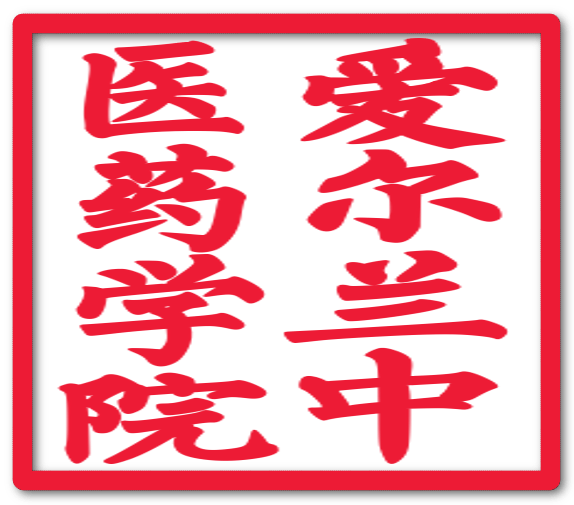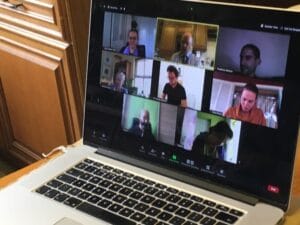
Exciting news – We are soon going to be launching our updated ICTCM website! We are thrilled to share our new platform with you after many months of hard work and dedication. We have made significant improvements to enhance your experience.
Some of the main changes include:
New user-friendly navigation – Simple and effective navigation menus to help users find information easily about all our Traditional Chinese Medicine courses, from our undergraduate-level Acupuncture TCM Training programme to our Postgraduate Certificate and Diploma courses in Chinese Herbal Medicine and Medical Qigong.
Content – we are also updating our content so the most up-to-date information will be available and easily accessible including the 2025-2026 Prospectus pack for the Acupuncture TCM Course. This will include current fee information, payment plan options, and the Application Form.
There will be a post on the new platform as soon as our Application process starts. Then you will be able to put in an application for the Lic.TCM Acupuncture training course that begins in October 2025.
Keep an eye open for the new site in about a weeks time!
Happy New Year of the Wood Snake
The Irish College of Traditional Chinese Medicine (ICTCM), and all its staff, wish a Happy Chinese New Year to our students, colleagues and friends in Ireland, China and across the world.
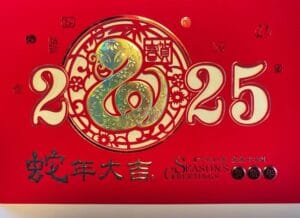
Happy New Year of the Wood Snake 2025
We look forward to renewing and extending good contacts with our old and honoured friends.
Wishing you all prosperity, health and happiness.
The Directors and Staff of the Irish College of Traditional Chinese Medicine.
FAQ- Is Moxibustion part of Acupuncture Training?

Moxibustion – Moxa Roll and loose Moxa
A frequently asked question about our Acupuncture Training course is what other therapies are taught alongside Acupuncture? There are other therapies in Traditional Chinese Medicine and some of these are taught on our undergraduate Licentiate programme. Others, such as Medical Qigong and Chinese Herbal Medicine, require postgraduate training.
The third and final year of the Licentiate is a clinical training year, with students treating clients under supervision. Part of the year’s learning involves other TCM therapies that are frequently used across TCM clinics. One such treatment is Moxibustion.
What is Moxibustion ?
Moxibustion has ancient origins having been mentioned in texts as old as 300 BC. It is a form of heat treatment which involves the use of a dried herb usually referred to as Moxa. It is a form of the herb called Mugwort in Engish. The Moxa used in TCM treatment comes in two main forms, as a moxa stick or in loose form.
How does it work ?
The herb, in the form of a moxa stick, is lit and held above a specific acupuncture point to create a therapeutic effect to, for example, remove cold from the body. A trained TCM practitioner can also use loose Moxa on certain acupuncture points in combination with garlic or ginger. Moxa is said to have specific properties which help therapeutic heat to go into the body.
Moxibustion can be used as a stand-alone treatment or combined with Acupuncture and other forms of TCM treatments.
What is it used for ?
Certain conditions of Cold and Damp are often treated with Moxibustion. It is therefore used more frequently in the Winter time and in countries with Cold and Damp climates. In fact in some extremely cold climates such as in northeast China, it is the main form of Chinese Medical Treatment.
Sometimes an Acupuncture practitioner may guide a client in the use of Moxibustion so the client can make use of a moxa stick at home between appointments.
There are, however, certain Acupuncture points which should never be used with Moxa, and Moxibustion is expressly prohibited for certain Chinese Medical conditions – for example those in which the client has too much Heat in the body.
Traditionally, daily application of Moxibustion treatment to a specific Acupuncture Point, was said to promote longevity.
If you would like to learn more about what is taught on the Licentiate in TCM Acupuncture Training course you can visit the course syllabus page on the ICTCM website. The ICTCM teachings are based on Traditional Chinese Medicine, meaning that it has a classical literary history of more than two thousand years.
Happy Christmas

Happy Christmas from the Irish College of Traditional Chinese Medicine
We wish all our Staff, Students, friends and TCM colleagues, in Ireland and across the world, a very Happy Christmas and a joyous New Year 2025.
If, in the meantime, you wish to make an enquiry about any of our events or courses we look forward to hearing from you, and we will respond to you in early January once the festive season is over.
From Tom and Mary
ICTCM, Christmas 2024.
The spread of Traditional Chinese Medicine globally

The spread of Acupuncture as part of Traditional Chinese Medicine
Acupuncture, a key component of Traditional Chinese Medicine (TCM), has a long and fascinating history that spans thousands of years. Its use and popularity have evolved significantly over time, both in China and globally.
TCM in the form of Acupuncture goes back to the new Stone Age in China. That is 8000 to 3000 BC. The first comprehensive documentation of Acupuncture as an organised system of diagnosis and treatment appears in ‘The Yellow Emperor’s Classic of Internal Medicine’ from the Han dynasty 206 bc-220 AD. This text established core concepts like Qi that remain central to Acupuncture theory today.
From its origins in China
Acupuncture gradually spread to neighboring countries: firstly,
- Japan
- Korea
- Then onto other Asian countries such as Vietnam, Sri Lanka and India.
Introduction to the West
In the west, Acupuncture first of all became known in Europe in
- Russia – which has a long tradition due, in part, to the long border between the USSR and China
- France in the 1500’s via Jesuits and travellers
- Germany
- England
- USA and Canada,
- At a similar time it arrived in Australia and New Zealand.
- It gradually spresad to other European countries such as Holland, Italy, Belgium, Norway, Denmark, Sweden, Spain and Ireland.
Ireland
TCM Acupuncture, meaning Acupuncture practises as part of Traditional Chinese Medicine, was first introduced to Ireland by Professor Thomas Shanahan in the early nineteen eighties, when he set up practices in both Dublin and Galway. Professor Shanahan then went on to set up the first college of TCM in Ireland, the ICTCM, in order to meet the demand for highly qualified TCM professionals both in Ireland and the UK. The ICTCM is now in its 43rd year of turning out highly trained Professional TCM Practitioners, fulfilling its mission to continue to enhance the reputation and spread of TCM globally.
Learning Pulse Diagnosis at the ICTCM
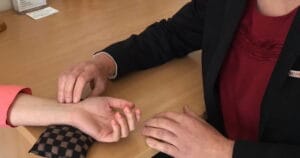
Learning Pulse Diagnosis at the Irish College of Traditional Chinese Medicine
Chinese Medical Diagnosis
At this time of year, second year students start learning Pulse Diagnosis at the Irish College of Traditional Chinese Medicine (ICTCM). Did you know that there are four distinctive ways of gathering diagnostically useful information in Chinese Medicine? These are referred to as Asking, Listening, Looking and Palpating. Pulse Diagnosis is part of Palpating (feeling).
Learning Pulse Diagnosis
Chinese Medical Pulse Diagnosis looks similar to, but is not the same as, “taking the pulse” in Western Medicine. It is one of the pillars of TCM Diagnosis and has been used in China for thousands of years. Chinese Medicine understands that the pulse, which is usually palpated at the radial artery on the wrist, can reveal important information about the internal state of the person’s Body, Mind and Spirit. It can assess the quality and quantity of their Five Vital Substances and the healthy functioning of their Zangfu. The TCM student is learning Pulse Diagnosis so that they can use it to assess a person’s health and diagnose imbalances. It provides a holistic insight into a client’s health.
Taking the pulse effectively requires plenty of practice. It is something students need to do repeatedly and which they will always be refining. When students are learning pulse diagnosis at the ICTCM they are encouraged to take as many pulses as possible whenever they can, to build up the sensitivity needed and discernment required to take the pulse effectively. Of course, in conjunction with refining their pulse-taking skills, they also have to learn and absorb a great deal of theoretical information about the significance of different types of pulse quality.
This diagnostic tool is invaluable in cases where a client cannot describe their medical problem clearly, does not speak the same language as the pratitioner or, for whatever reason, is unable to articulate or explain their situation. However, although Pulse Diagnosis is highly prized, the practitioner of Chinese Medicine will still use all the diagnostic methods available to them to build up a full picture before making a TCM diagnosis and carrying out a treatment – often using TCM Acupuncture.
Learning Pulse Diagnosis on the Lic.TCM Course
This is just one of many fascinating aspects of Chinese Medical Diagnosis that students learn at the Irish College of Traditional Chinese Medicine as part of the Licentiate in TCM. If you are thinking of studying TCM or TCM Acupuncture you should ensure that the course you choose includes Pulse Diagnosis.
If you would like to view our course syllabus you can find it at this link as well as general information about the Lic.TCM .
Students of Chinese Medicine 2024
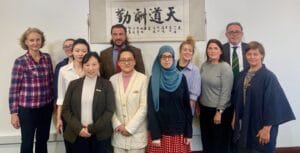
Some of our new and returning Chinese Medicine students October 2024
The Irish College of Traditional Chinese Medicine’s 2024 Academic year has now started. It was our pleasure welcoming the Chinese Medicine students 2024 to our College in Dublin 3.
The new students had a busy two days in college.
Firstly they were introduced to the College itself including its ethos and aspirations.
Secondly they were introduced to some of the basis concepts of Traditonal Chinese Medicne. This included the Theory of Yin and Yang. During this, students learned that these simple labels represent a host of Chinese Medical understanding of health and illness.
Thirdly, all the students, spent a lot of the weekend practising Acupuncture Point Location. This is one of the essential practical skills of an Acupuncture TCM practitioner enabling them to learn the skills of quickly, efficiently and accurately finding where the Acupuncture points are located.

Students of Chinese Medicine enjoying learning Acupuncture Point Location
Accurate Acupuncture Point location is essential to ensure that, when the students are getting close to starting the Clinical Training in the third year of the course, they can practise needling the points safely. This is done under the supervision of a trained Clinical Teacher.
During the first weekend of this academic year, the new first year students met the second years. The Second years have already trodden the same path and are happy to share their advice and guidance.
The new students also met many, but not yet all, of our teaching staff. The rest of us in the Teaching team are looking forward to meeting them all in November.
In the meantime, the whole Irish College of TCM teaching and admin team want to say:
欢迎你们都来到爱尔兰中医药学院
Fáilte go Coláiste na hÉireann um leigheas Sínis traidisiúnta.
Welcome to the Irish College of Traditional Chinese Medicine

WELCOME
TO THE IRISH COLLEGE OF TCM
A lecture room waiting for our students to arrive.
As we kick off another exciting college year, we warmly welcome both new and returning students to the Irish College of Traditional Chinese Medicine. This new academic year brings fresh opportunities, challenges, and the chance to grow both academically and personally. Whether you’re joining the ICTCM for the first time or returning after the summer break, this is a time to embrace new beginnings.
For new students, it’s an occasion of exploration and adjustment. You’ll be navigating the academic world of college life. This is your chance to build lasting connections and shape your future in the world of TCM.
For returning students, welcome back! You’ve already shown resilience and dedication in your college journey, and now it’s time to continue pushing forward. Whether you’re approaching graduation or entering the next phase of your studies, this year brings new demands and possibilities to deepen your skills and knowledge.
We’re excited to see what you will achieve and how you will contribute to college life. Welcome to the new year, and best of luck from all at the Irish College of Traditional Chinese Medicine!
Applications are now closed for this year’s Acupuncture TCM Lic.TCM course. Applications for October 2025 will open in February.
Why the Irish College of Traditional Chinese Medicine was set up
Why the Irish College of Traditional Chinese Medicine was set up
When Prof Tom Shanahan first introduced Acupuncture Training in Ireland in the early 1980s, very few people had heard of Acupuncture, TCM or Chinese Medicine. The Irish College of Traditional Chinese Medicine (ICTCM) was set up in 1983 to help satisfy the growing demand for safe alternative healthcare. It was the first college providing Acupuncture Training in Ireland and is devoted to the teaching of Chinese medicine, according to the Classical Traditions of TCM, giving students a theoretically-secure base for establishing sound clinical practice of Acupuncture and TCM.
Acupuncture and TCM are now at the forefront of alternative approaches to health and illness, focusing as they do, not only on treating and curing current illness but also on disease prevention and on health enhancement.
As more people are interested in finding a medical system that is natural, holistic and, in the hands of a well-trained and fully qualified Acupuncturist or TCM practitioner, safe, more students are seeking to join our College in Dublin to complete Acupuncture Training in Ireland.
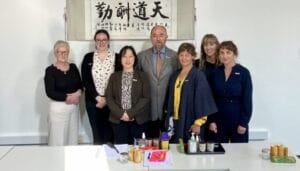
Acupuncture Training in Ireland
Clinical trainees and Staff 2024
The professional Acupuncture and TCM body, The Professional Register of Traditional Chinese Medicine, provides further information about qualified practitioners on its website.
The ICTCM’s Mission Statement
Our mission is to enhance the reputation and spread of Traditional Chinese Medicine (TCM). To this end we provide comprehensive theoretical and practical professional Acupuncture training in Ireland, during which Acupuncture is taught as part of Traditional Chinese Medicine. In doing this, we are helping to provide the public with fully trained, fully qualified and fully insured Acupuncturists in whom they can have complete confidence.
As our next 2024 Licentiate in Traditional Chinese Medicine Acupuncture training Course begins on the first weekend in October, we will be closing applications for this year’s course on 20th September. There is still time to make a late application, and you can find the prospectus pack here.
Can I study Medical Qigong at the ICTCM in Dublin?

Professor Xia our Medical Qigong Master with students studying Medical Qigong at the ICTCM in Dublin.
When people contact us at the Irish College of Traditional Chinese Medicine in Dublin they often ask, “Can I study Medical Qigong at your College”? The answer is Yes, provided you are already a fully trained fully qualified practitioner of Acupuncture TCM. Because the College is a Chinese Medical college, the type of Qigong we teach is specifically tailored for use in the TCM Clinic. We run a number of intensive programmes in Medical Qigong at post-graduate level.
Some people, when they join us on the Licentiate in TCM Acupuncture Training course, already know that they really want to study Medical Qigong. At least one of our current Teachers was not specifically interested in Acupuncture Medicine per se but studied with us in order to be able to gain the necessary Chinese medical knowledge to become a TCM practitioner and then learn Medical Qigong. He is now in full time TCM practice using Acupuncture, Medical Qigong and Chinese Herbal Medicine according to the needs and requirements of each individual client.
Many Acupuncture TCM students only become interested in Qigong and Medical Qigong as they progress in their Acupuncture training and hear from the College Director, Professor Tom Shanahan, about the wonderful effects of Medical Qigong. He tells students about his experiences in China studying this specialist branch of TCM treatment at one of the top Chinese Medical Universities in China with a leading Qigong Master.
A number of TCM practitioners have recently qualified with us in Medical Qigong at Certificate level and Diploma level and you can read about this on the PRTCM website.
If you are not yet a qualified practitioner of Acupuncture TCM but are keen to be qualified to study Medical Qigong in the future, there are still a few places left on this year’s Licentiate in TCM. We will soon be closing applications for this Acupuncture training programme.
It is often possible to begin some aspects of Qigong training, as an additional option, even during the First year of the Acupuncture Course (staff availability permitting).
If you are already a fully trained TCM Aupuncturist and wish to know about our next Medical Qigong start date please contact us.
If you are interested in our short one or two day introduction to Qigong for Health and Wellbeing, which we will be running in the Spring (if not earlier) please contact us – send us your name and email address, and your reasons for wishing to study Qigong and we will inform you when the next workshops in Qigong are being run.
As one of the main Qigong and Medical Qigong teachers at the College it is always a pleasure for me to inform people about the transformative benefits that can arise from practising Qigong and using Medical Qigong with clients.

